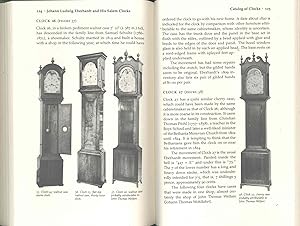Albright Frank William Rahn Francis (1 results)
Product Type
- All Product Types
- Books (1)
- Magazines & Periodicals
- Comics
- Sheet Music
- Art, Prints & Posters
- Photographs
- Maps
-
Manuscripts &
Paper Collectibles
Condition
- All Conditions
- New
- Used
Binding
- All Bindings
- Hardcover
- Softcover
Collectible Attributes
- First Edition
- Signed
- Dust Jacket
- Seller-Supplied Images
- Not Printed On Demand
Seller Location
Seller Rating
-
Johann Ludwig Eberhardt and his Salem clocks
Published by Chapel Hill : Published for Old Salem, inc., Winston-Salem N.C. by University of North Carolina Press, 1978, 1978
ISBN 10: 0807813249ISBN 13: 9780807813249
Seller: Joseph Valles - Books, Stockbridge, GA, U.S.A.
Book
Hardcover. Condition: Very Good. x, 160 p. : ill. ; 23 cm. ; ISBN: 0807813249; 9780807813249 LCCN: 77-18955 ; LC: TS544.8.E23; Dewey: 681/.113/0924; B ; OCLC: 4128704 ; green cloth ; no dustjacket ; ex-lib, stamps, labels, date due, pocket ; "Johann Ludwig Eberhardt was a German clockmaker strangely enough trained in the English tradition of clockrnaking in of all places, Holland. At age 41 Eberhardt left Europe at the invitation of a Moravian settlement in Salem, North Carolina to arrive in late 1799. His story as a clockmaker in frontier America from 1800 to 1835 is well documented by the author from Moravian records. It seems that Mr. Eberhardt, the clockmaker, had one weakness, he drank to excess resulting in wife-beating and an inability to control his finances. Because of this, the officials in the Moravian settlement were constantly considering his conduct, examining his financial situation and putting him on and off what we today would term probation. These Moravian records exist and form half the facts concerning Eberhardt. The second half of the facts come from the clocks Eberhardt made. When reading this book one has to remember that the author wrote it in the mid-1970's when much of the information we now have about white painted dials was not available. In fact the author states that he is not aware of how to date the clocks from the features on the dials. Nevertheless, the author does an excellent job and his attribution of dates to 35 of Eberhardt's clocks are nearly flaw-less. The author also does an excellent job in describing how a clockmaker functions in the first half of the 1800's. What parts did the "maker" purchase from parts houses in Philadelphia that were termed "Birmingham goods" meaning they were made in Birmingham, England? These parts included dials, hands, cast brass movement plates and wheel blanks. The clockmakers task was to turn these purchased parts into a working clock. The cases for Eberhardt's clock movements were made by skilled cabinetmakers in Salem's Moravian furniture shops."--Arlington Books ; VG. Book.


